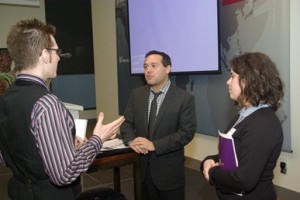 Neal Rosenburg combined degrees in nursing and French literature into a career that is helping erase the stigma of HIV among student nurses in the United States and Cameroon.
Neal Rosenburg combined degrees in nursing and French literature into a career that is helping erase the stigma of HIV among student nurses in the United States and Cameroon.
Rosenburg, an assistant professor in the Goldfarb School of Nursing at Barnes Jewish College in St. Louis, Mo., shared his knowledge and research findings during a visit to the Linfield-Good Samaritan School of Nursing in April. He spoke to student groups, met with faculty and gave the keynote presentation at the annual reception for nursing and health sciences alumni, held at the Mercy Corps headquarters in downtown Portland. He also connected with Linfield nursing students and alumni who have worked in clinics and hospitals in Cameroon as part of January Term classes.
Although Rosenburg had dreamed of being a nurse, when he graduated from high school, nursing schools had long wait lists. Instead, he completed a degree in French literature and soon after, he was accepted into nursing school. Now, his research in Cameroon allows him to combine his knowledge of the French language with his nursing background and research interests.
“To be able to go into Francophone Africa as an American researcher gives us in the West a great presence,” he said. “Most of researchers in that part of the world are primarily French, Belgian and Swiss.”
His interest in HIV-related illness stemmed from watching the AIDs epidemic devastate the gay community.
“I really wanted to step in and do whatever I could to help,” Rosenburg said. “At that time – and still today – the stigma of the illness is enormous. People just needed to try to combat some of that. I thought that this is where I could make a difference.”
As a labor and delivery nurse at Barnes Jewish Hospital in St. Louis, Rosenburg became involved in trying to give HIV-infected pregnant women the tools to stay as healthy as possible during and after pregnancy with an ultimate goal of keeping the infant from becoming HIV infected. The program and protocols developed have been so successful that now less than 2 percent of all babies born to HIV-infected mothers in the United States actually have HIV, Rosenburg said.
“It’s unbelievable, considering that 15 years ago those numbers were drastically different,” he said. “We have it down to an art if we can get women engaged in medical care and monitor and educate them so they can give birth to children who are HIV negative and who can lead full and complete lives.”
In 2008, Rosenburg was the alternate for a Fulbright grant to Cameroon designed to explore the transmission rates of HIV from mother to child and possible methods to help women prevent infecting their babies with the virus. Although he was selected as an alternate, he maintained his contacts and was eventually able to pursue his research. In 2009, he began a cross-sectional study to examine Cameroonian nursing students’ perceptions of HIV-related stigma, within the context of two factors: stigma perpetuated by nurses and stigma experienced by nurses.
One of his goals is to change the view of HIV. “Making it less scary will only enhance the caring of individuals worldwide that are affected by and infected with HIV,” he said. “We hope that by starting at the student level, there will be less stigma associated with HIV.”
Rosenburg also hopes to help nursing students develop an understanding of global health care issues; identify culturally competent assessments; transfer knowledge of culturally appropriate HIV nursing care; and develop peer-training programs.
He believes international study is important for all students, but especially for nurses.
“As an individual, it broadens the lens of how you look at the world,” Rosenburg said. “We are in such an increasingly diverse nation and we are going to be providing care for an array of individuals. It helps students to be immersed in another culture to really understand how to treat patients.”
He said that students may never encounter Cameroonians in their practice, but they will encounter someone else from a different culture and country and then can step back and consider how to approach a situation.
Rosenburg was drawn to nursing for its caring aspects. “There’s a big difference between the physician and nursing roles,” he said. “The difference for me is being in the present with the patient, in happy times, sad times and some of the most difficult moments of their lives. That’s one of the strongest pieces of what a nurse can do.”

